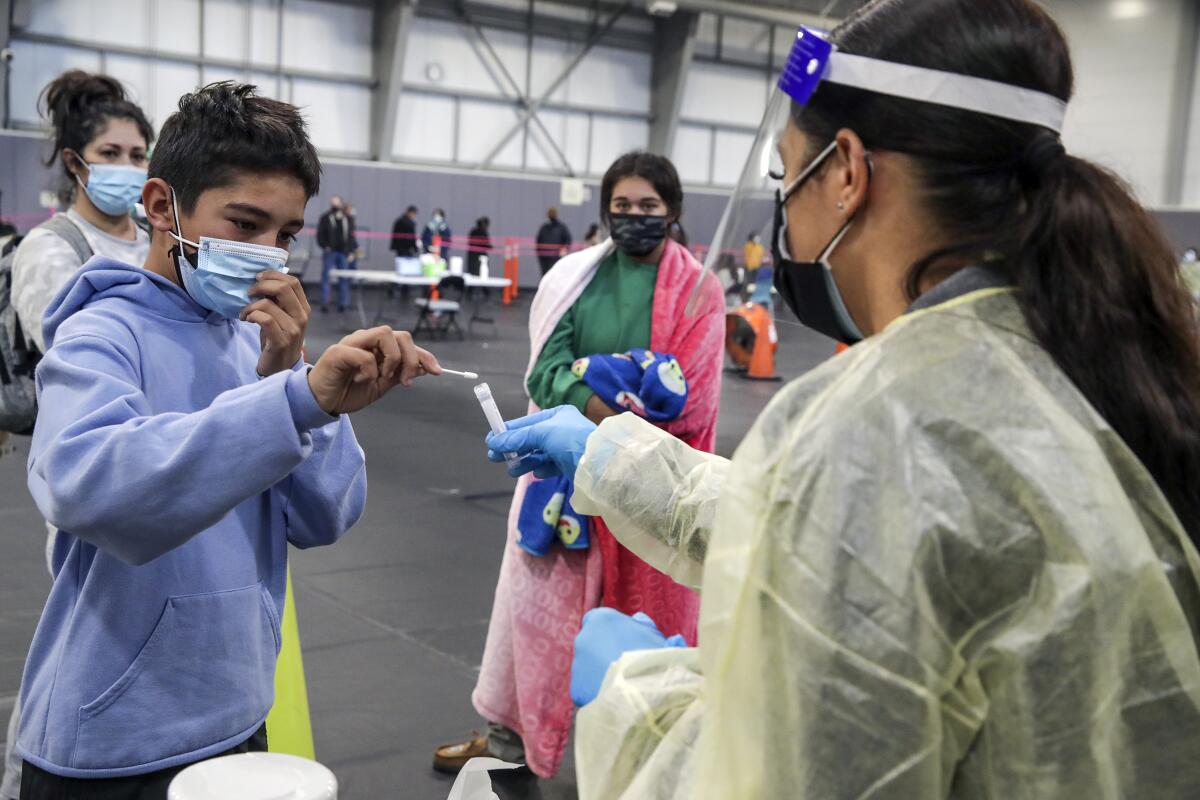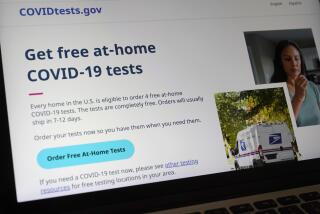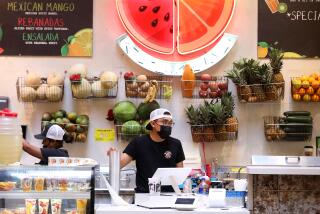Despite rising cases, free coronavirus testing is reduced in L.A. County

Despite an increase in coronavirus cases, the availability of free testing sites has been reduced due to the stalemate in Washington over approving new COVID-19 pandemic funding.
The federal government has stopped offering money to fund coronavirus tests for uninsured people. After hitting a March 22 deadline, the U.S. Health Resources and Services Administration is no longer accepting claims from health providers to get reimbursed for coronavirus testing under the program.
As a result, L.A. County has been forced to remove 25 community testing sites from the countyâs website, âas those sites were no longer able to continue to commit to providing tests free of charge to individuals who lacked insurance coverage,â said Dr. Christina Ghaly, the countyâs Department of Health Services director. There are still 200 testing sites listed on the countyâs coronavirus testing website. To be on the countyâs list, the sites need to be willing to provide tests for free to everyone who arrives, regardless of insurance status.
L.A. County still plans to continue to offer coronavirus testing at no charge â including the uninsured â by temporarily using funds from other sources, such as a grant from the U.S. Centers for Disease Control and Prevention program and American Rescue Plan Act funds, Ghaly said.
âWe will keep doing this as long as possible,â Ghaly said, but that means the county will need to spend more of its money. Depending on how many tests are requested, the county could be at risk of having to spend an additional $5 million to $10 million a month to pay for coronavirus tests for uninsured people or insured people who arenât sharing their insurance information.
âWeâre hopeful that the federal government again replenishes that fund and fills that gap,â Ghaly said.
Lawmakers in Washington have been working on a compromise, but hopes for a $10-billion bipartisan deal established earlier this week have fizzled out, stuck amid a controversy over lifting Trump-era curbs on migrants entering the U.S. The deal is less than half of President Bidenâs initial request for $22.5 billion.
L.A. County Supervisor Hilda Solis said she has heard the Senate is unlikely to vote on the federal funding proposal this week, and probably wonât take action until after the Easter break.
âBy that time, we could see an increase in this variant,â Solis said at Tuesdayâs Board of Supervisors meeting, referring to the Omicron BA.2 subvariant thatâs playing a role in an increase in coronavirus cases in Los Angeles, San Diego and San Francisco counties.
One company said that regular payments had been halted under the federal program even before the deadline to submit claims to get reimbursed for coronavirus testing.
Geoffrey Trenkle, chief medical officer of Total Testing Solutions, which provides coronavirus testing in the Los Angeles area, said his company has not gotten paid for any claims it submitted for coronavirus testing for uninsured people after the middle of February.
âItâs been almost three full weeks since we received the last payment,â he said on Tuesday. âWhen we ask, âWhen are payments coming through?â they say, âWe donât know.ââ
The halted funding led Total Testing Solutions to furlough the bulk of its employees â more than 100 people â beginning Friday, Trenkle said.
The chief medical officer added that because the deadline to turn in claims for funding tests was announced so abruptly â just a week before the claims were due â the company expects to lose out on roughly $2 million in unpaid claims for both testing and vaccinations for uninsured people.
âThey basically said, âEven though you did the work, we wonât pay you unless you submit by this date,ââ Trenkle said. He added in an email: âThis was the federal government saying, âThanks for all the hard work,â and then turning and slapping us in the face.â
A Health Resources and Services Administration spokesperson said in an email that âwhile no new claims for testing, treating and administering vaccines to the uninsured are being accepted due to a lack of supplemental COVID funding from Congress, HRSA is continuing to pay claims received prior to the submission deadline subject to the availability of funds.â
âHRSA continues to work through claims submitted by the deadlines, which will be paid subject to their eligibility and the availability of funds,â the agency said.
Although the federal program has stopped accepting claims, the California Department of Health Care Services recently told health providers it will continue to take claims for people enrolled in its COVID-19 Uninsured Group Program, which can cover testing and treatment services. That program will end shortly after the federal COVID-19 public health emergency is declared over.
Ghaly said she is strongly encouraging people without insurance to seek coronavirus testing if they have a reason to do so, such as if they have COVID-like symptoms or if they have been around anyone with COVID-19.
âThey can still find a site that offers free COVID testing â no out-of-pocket costs â by going to the countyâs testing website, and thatâs covid19.lacounty.gov/testing,â Ghaly said.
Those who do have insurance should use testing options through their health provider or through their health plan, Ghaly said. Insured people who do access testing services through the county are still asked to share their insurance card information.
For those insured, âthe individual getting the test doesnât have to pay anything out of pocket. But theyâre providing their insurance information â and then thereâs no cost to the county,â Ghaly said. âIf the person doesnât have insurance, or if they provide insurance information but itâs not accurate or up to date, then thatâs where the county bears the cost.â
Those people wonât be charged for the test, but their insurer will be â reserving the countyâs limited funds to cover those who are uninsured.
People who are insured also have the ability to order eight at-home tests a month for every covered person on their health plan and get reimbursed for them by their health provider. The U.S. government began requiring insurance companies to reimburse for those tests beginning in mid-January.
In addition, every household in the U.S. is eligible to get two sets of four at-home tests mailed to them for free. People can order those tests at covidtests.gov or by calling (800) 232-0233. While many people ordered their first set of tests in January or February, the government allowed households to request a second set of free tests in March.
Jeff Zients, the outgoing coordinator of Bidenâs COVID-19 task force, said Tuesday that the federal COVID-19 spending plan is essential to fund immediate needs for tests, vaccines and anti-COVID drugs.
âThe $10 billion for domestic efforts funds some of these urgent needs, but we still need additional funding for both our domestic effort and our global efforts,â Zients said at a news conference. âEvery dollar we requested is critical to both our domestic and global response.â
The $10 billion plan does not include any additional funding for global COVID-19 response efforts, which Zients warned has âreal implications on our efforts to vaccinate the world.â
Without additional funds, the U.S. will be unable to help countries get more shots in arms, he said, and âbe forced to scale back the work that we do to provide oxygen and other lifesaving supplies to countries that need them.â
In addition, a lack of global funding will reduce the capability to monitor new variants, which âundermines our ability to detect emerging variants beyond our borders.â
âThe virus knows no borders, and itâs in our national interest to vaccinate the world and protect against any possible future variants,â Zients said. With the U.S. having an ample supply of vaccines, âwe need to turn those vaccines into vaccinations around the world.â
Citing a lack of funds, the U.S. Health Resources and Services Administration on Tuesday also stopped accepting claims for vaccine administration for those who are uninsured.
Despite that, the Orange County Health Care Agency said it will continue to offer vaccinations and testing kits at its sites for anyone, regardless of insurance or immigration status, said Dr. Regina Chinsio-Kwong, the county health officer. A list of those sites are available at ochealthinfo.com/covid.
The Associated Press contributed to this report.
More to Read
Sign up for Essential California
The most important California stories and recommendations in your inbox every morning.
You may occasionally receive promotional content from the Los Angeles Times.












